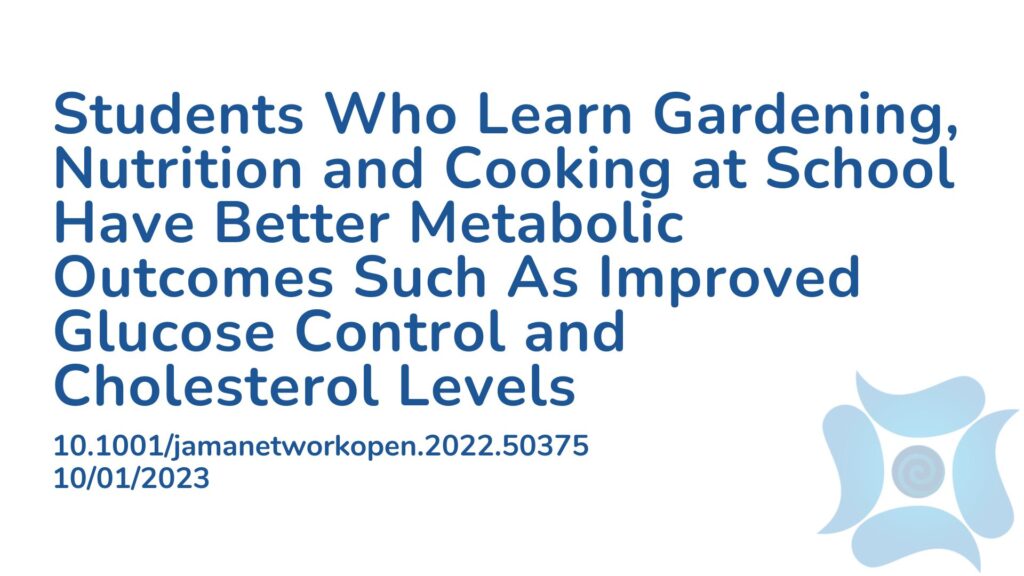Summary:
There is currently no randomized clinical trial that has evaluated the effects of a school-based gardening intervention on the health of children, despite it being increasingly implemented in schools with anecdotal evidence of improved health and wellbeing. The objective of this paper was to evaluate the impact of teaching school children about gardening, nutrition and cooking on their metabolic health outcomes. The study was conducted over three years at low-income elementary schools with mostly Hispanic students. The intervention consisted of growing and looking after a garden and nutrition and cooking lessons. The results were measured via the students body mass index, blood sugar parameters and cholesterol levels. The results showed that the school students had improved glucose control and reduced cholesterol in youth at high-risk of metabolic complications. These findings suggest that elementary schools should include garden and nutrition based interventions as a way to improve metabolic parameters in school children.
Abstract:
Importance: Although school-based gardening programs for children have consistently been shown to improve dietary behaviors, no cluster randomized clinical trial (RCT) has evaluated the effects of a school-based gardening intervention on metabolic outcomes. Objective: To evaluate the effects of a school-based gardening, nutrition, and cooking intervention (Texas Sprouts) on changes in metabolic outcomes in elementary schoolchildren. Design, Setting, and Participants: This study was a secondary analysis of a cluster RCT, conducted over 3 years from 2016 to 2019, at low-income elementary schools with majority Hispanic students in the greater Austin, Texas, area. Data were analyzed from January to August 2022. Interventions: Texas Sprouts was 1 school year long (9 months) and consisted of (1) Garden Leadership Committee formation; (2) a 0.25-acre outdoor teaching garden; (3) 18 student gardening, nutrition, and cooking lessons taught by trained educators throughout the school year; and (4) 9 monthly parent lessons. The delayed intervention was implemented the following academic year and received an identical intervention. Main Outcomes and Measures: The following measures were obtained at baseline and postintervention (9 months): demographics via survey; measured height, weight, and body mass index parameters; and glucose, insulin, homeostatic model assessment of insulin resistance, and a lipid panel via an optional fasting blood draw. Results: Sixteen elementary schools were randomly assigned to either Texas Sprouts intervention (8 schools) or to delayed intervention (control, 8 schools). A total of 3302 children (aged 7-12 years) were enrolled in Texas Sprouts, and fasting blood samples were obtained from 1104 children (or 33% of those enrolled) at baseline. The final analytic sample included 695 children (307 boys [44.17%]; mean [SE] age, 9.28 [0.04] years; 480 Hispanic children [69.02%]; 452 [65.03%] eligible for free or reduced lunch) with complete demographic data and baseline and postintervention (9-month) fasting blood draws. Compared with control schools, children from Texas Sprouts schools had a 0.02% reduction in mean hemoglobin A1c (95% CI, 0.03%-0.14%; P = .005) and a 6.40 mg/dL reduction in mean low-density lipoprotein cholesterol (95% CI, 3.82-8.97 mg/dL; P = .048). There were no intervention effects on glucose, insulin, homeostatic model assessment of insulin resistance, or other lipid parameters. Conclusions and Relevance: In this cluster RCT, Texas Sprouts improved glucose control and reduced low-density lipoprotein cholesterol in high-risk youth. These findings suggest that elementary schools should incorporate garden-based interventions as a way to improve metabolic parameters in children.
Article Publication Date: 10/01/2023
DOI: 10.1001/jamanetworkopen.2022.50375



